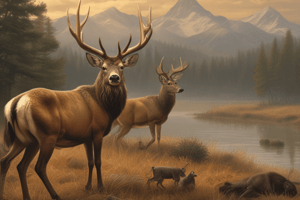Podcast
Questions and Answers
Give fine reasons why we have hunting laws.
Give fine reasons why we have hunting laws.
During the 19th century animals were nearly hunted to extinction, establishing hunting season, that limit harvesting and avoid nesting and mating seasons, establish safety guidelines for hunting that protect both hunters and non-hunters.
State how the father of management defined an ethical hunter.
State how the father of management defined an ethical hunter.
Ethical hunters do the right thing - even when doing the wrong thing is legal.
Describe how responsible and ethical hunters show respect for natural resources.
Describe how responsible and ethical hunters show respect for natural resources.
Like leaving the land better than you found it, report game violations, strive for quick clean kill.
Describe how responsible and ethical hunters show respect for other hunters.
Describe how responsible and ethical hunters show respect for other hunters.
Describe how responsible and ethical hunters show respect for landowners.
Describe how responsible and ethical hunters show respect for landowners.
Describe how responsible and ethical hunters show respect for non-hunters.
Describe how responsible and ethical hunters show respect for non-hunters.
Identify public and private land where you can go hunting.
Identify public and private land where you can go hunting.
List and describe the five stages of hunter development: shooting, limiting-out, trophy, method, __________ stage.
List and describe the five stages of hunter development: shooting, limiting-out, trophy, method, __________ stage.
Give three examples of what you can do to be involved in making hunting a respected sport.
Give three examples of what you can do to be involved in making hunting a respected sport.
Study Notes
Hunting Laws and Their Importance
- Hunting laws were established to prevent the extinction of species after widespread hunting in the 19th century.
- These laws create specific hunting seasons to protect animals during nesting and mating times.
- Safety guidelines are set in place to safeguard both hunters and the general public.
Definition of an Ethical Hunter
- An ethical hunter prioritizes morally right actions over legal loopholes, emphasizing integrity in hunting practices.
Respect for Natural Resources
- Responsible hunters leave nature in better condition than they found it, advocating for conservation.
- Reporting game violations is a key practice to uphold rules and ensure sustainability.
- Striving for a quick and clean kill demonstrates respect for the animal and minimizes suffering.
Respect for Other Hunters
- Sharing knowledge and skills fosters a supportive hunting community.
- Ethical hunters avoid interfering with others’ hunts, maintaining a respectful distance.
- The consumption of alcohol is discouraged to ensure safety and prevent danger to self and others.
Respect for Landowners
- Always seek permission from landowners before hunting on their property.
- Treating livestock and crops with care shows appreciation for the landowner’s resources.
- Offering a portion of the harvest can cultivate goodwill and positive relationships with landowners.
- Gates must be left in their original state to maintain the integrity of the land.
Respect for Non-Hunters
- Keeping firearms concealed helps prevent unnecessary alarm among non-hunters.
- Animals should be transported discreetly to avoid public distress; display is discouraged.
- Maintaining a clean appearance, free of blood or dirt, promotes a positive image of hunters in public.
Hunting Locations
- Public hunting opportunities are available in national parks and state forests.
- Private lands may also be utilized for hunting, often requiring explicit permission from landowners.
Five Stages of Hunter Development
- Stages include:
- Shooting Stage: Focus on acquiring basic shooting skills and safety.
- Limiting-Out Stage: Learning effective strategies to meet bag limits.
- Trophy Stage: Pursuing high-quality game for trophies rather than quantity.
- Method Stage: Developing personal preferences and hunting techniques.
- Sportsman Stage: Emphasizing ethical behavior and appreciation for nature in hunting.
Promoting Respect for Hunting
- Engaging in responsible and ethical behaviors enhances the reputation of hunting as a sport.
- Personal involvement in conservation efforts and community education is essential for hunting’s future.
Studying That Suits You
Use AI to generate personalized quizzes and flashcards to suit your learning preferences.
Description
Explore important concepts regarding hunting laws and ethical hunting practices through these flashcards. Learn about the historical context of hunting regulations and the definition of an ethical hunter. Perfect for those interested in wildlife conservation and responsible hunting.




